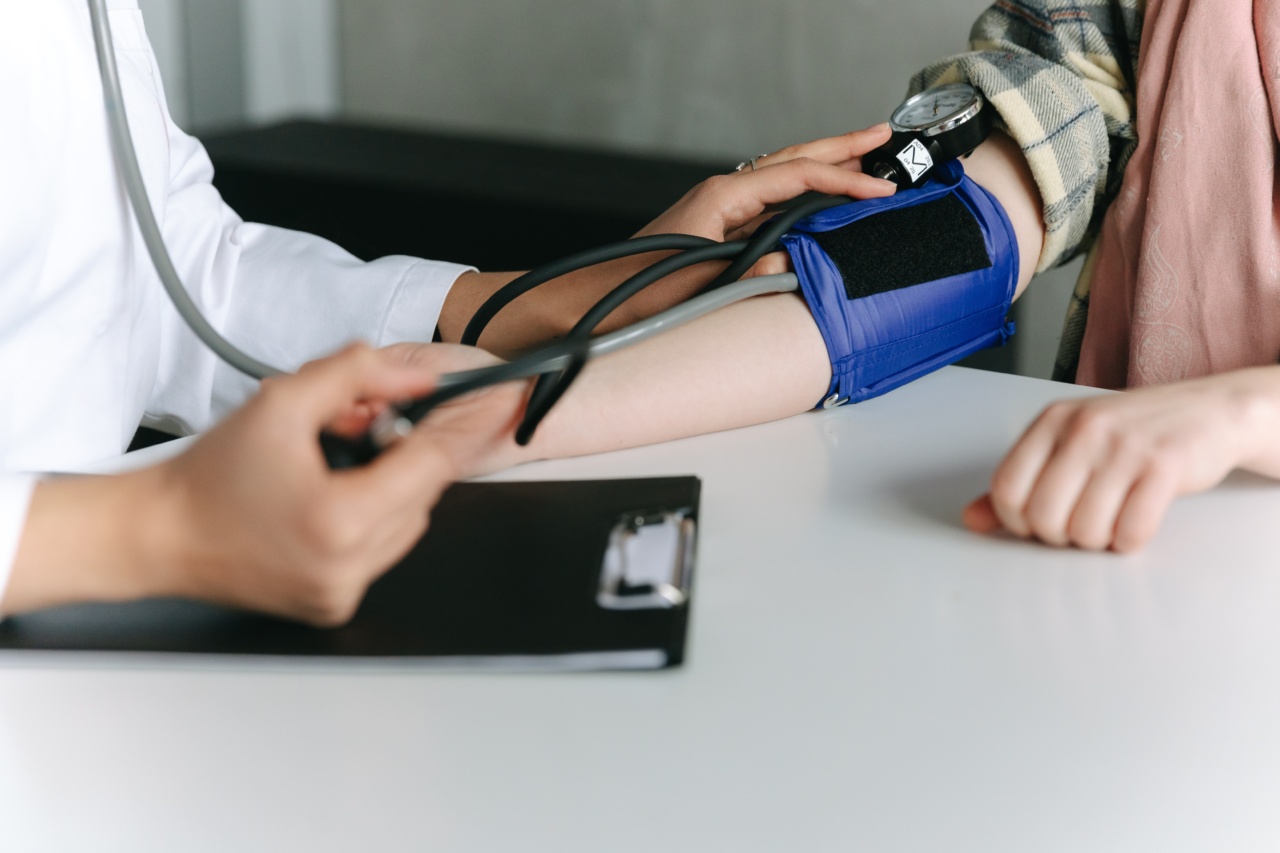Hypertension, commonly known as high blood pressure, is one of the most common health conditions across the globe.
It is characterized by the increased force of blood against the arteries, causing damage to the blood vessels and leading to several health complications, such as heart disease, stroke, kidney disease, and dementia. High blood pressure can be managed through medication, lifestyle modifications, and some effective preventive measures that minimize the risk of developing hypertension. Here are some effective tips for hypertension prevention:.
1. Maintain a healthy weight
Being overweight or obese puts additional pressure on the blood vessels and increases the risk of developing high blood pressure. To maintain a healthy weight, you should follow a balanced and nutritious diet and engage in regular physical activity.
Include plenty of fruits, vegetables, whole grains, and lean proteins in your diet and limit the intake of high-calorie foods that are rich in saturated fats and added sugars. Aim for 30 minutes of moderate-intensity exercise most days of the week, such as brisk walk, cycling, swimming, or dancing.
2. Reduce Sodium Intake
Reducing sodium intake in the diet can help lower blood pressure, especially in people who are salt-sensitive. Excessive sodium intake retains water in the bloodstream, increasing the volume of blood and putting added stress on the blood vessels.
Therefore, it is essential to limit the intake of sodium-rich foods such as processed and canned foods, pickles, sauces, cheese, and salty snacks. Instead, opt for fresh fruits and vegetables, whole grains, low-fat dairy products, and lean proteins that are low in sodium.
3. Increase Potassium Intake
Potassium is a mineral that helps regulate fluid balance in the body, and it can help counteract the effects of sodium in the diet. Eating potassium-rich foods can help lower high blood pressure and reduce the risk of cardiovascular disease.
Some potassium-rich foods include bananas, oranges, cantaloupe, sweet potatoes, spinach, beans, and yogurt. Consult with your doctor before initiating any potassium supplements.
4. Limit Alcohol Intake
Limiting alcohol intake can prevent high blood pressure, especially if you have pre-existing hypertension. Alcohol can raise blood pressure and also reduce the effectiveness of hypertension medications.
If you do consume alcohol, limit your intake to no more than a drink or two per day, and avoid binge drinking.
5. Quit smoking
Smoking can lead to narrowing of blood vessels and cause the walls of the vessels to become thick, increasing the risk of developing hypertension.
If you are a smoker, quitting smoking can help reduce the risk of hypertension and also improve your overall health. Seek help from your doctor or support groups to quit smoking. There are several smoking cessation medications and patches available for those who want to quit smoking.
6. Manage Stress
Stress can cause temporary spikes in blood pressure, but chronic stress can lead to long-term hypertension. Managing stress levels can help reduce the risk of developing hypertension.
Engage in activities such as yoga, meditation, deep breathing exercises, or progressive muscle relaxation to reduce stress and promote relaxation. Also, engage in activities that you enjoy and spend quality time with family and friends to manage stress levels.
7. Monitor Blood Pressure Regularly
Regular monitoring of blood pressure can help detect hypertension in the early stages, and early intervention can help prevent further damage to the blood vessels.
If you have a pre-existing medical condition that increases the risk of hypertension, such as diabetes or kidney disease, it is advisable to check your blood pressure regularly. Also, if you have a family history of hypertension, or if you are over the age of 40, it is recommended to monitor blood pressure regularly even if you have no symptoms.
8. Take Medications As Prescribed
If you have hypertension, taking medications as per the physician’s prescription is important to keep blood pressure under control.
Some people stop taking medications once their blood pressure levels drop down or they feel better, but this can lead to complications, worsening of hypertension or its recurrence. It is important to take medications strictly as prescribed by the healthcare provider and for the complete duration of the treatment course.
9. Regular Health Check-ups
Regular health check-ups can help detect risk factors associated with hypertension and can help initiate interventions for the prevention of high blood pressure.
Blood pressure screening should begin at an early age and should be conducted regularly for those with pre-existing medical conditions that predispose them to hypertension or those at risk of developing hypertension. Also, routine health check-ups, which include cholesterol screening, blood glucose level testing, and comprehensive metabolic panel tests, can reveal other risk factors that may lead to hypertension.
10. Take Supplements As Per The Doctor Recommendation
If you are at risk of developing hypertension, or you have a pre-existing hypertension condition, your healthcare provider may recommend supplements to lower blood pressure levels.
However, it is essential to take these supplements only as per the physician’s instructions. Some common supplements that may help lower high blood pressure include fish oil, garlic, and magnesium. Consult with your healthcare provider before initiating any of these supplements.
Conclusion
Hypertension is a common health condition that affects millions of people worldwide. However, it is preventable if you follow a healthy lifestyle, take preventive measures, and manage risk factors that predispose you to the condition.
The above tips are effective measures that can prevent hypertension and reduce the risk of its complications. Following a healthy diet, engaging in regular physical activity, limiting sodium and alcohol intake, and quitting smoking can go a long way in preventing high blood pressure.
Additionally, managing stress, monitoring blood pressure regularly, taking medications as prescribed, undergoing regular health check-ups, and taking supplements as per the doctor’s recommendation can help keep hypertension under control and prevent its complications.































